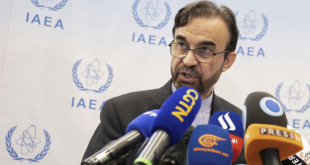VIENNA (AP) — Russia has proposed that new talks on Iran’s nuclear programme take place March 20, preferably in Vienna, in what diplomats characterised Saturday as an effort to head off a showdown at the UN Security Council.A Western diplomat, who demanded anonymity in exchange for divulging confidential information, said Moscow was seeking high-level talks with the United States, China, France and Britain — the other four permanent members of the Security Council.
The Russians also wanted the participation Mohamad Al Baradei, head of the International Atomic Energy Agency, and of Germany, part of the so-called European troika along with France and Britain that broke off talks with Iran last year after Tehran resumed preliminary work on uranium enrichment.
Baradei incurred US displeasure recently by suggesting that Iran be allowed to run small-scale uranium enrichment if it agrees to give up a full-blown programme. Russia initially backed the suggestion but scrapped it due to strong US opposition.
“The Russians are… pushing for a meeting in Vienna March 20,” said the Western diplomat. He suggested that Moscow’s emphasis on talks outside New York was an attempt to take the focus off Security Council deliberations on how to cajole Iran into reimposing a freeze on enrichment and fully cooperating with an IAEA probe of its suspect nuclear programme.
A diplomat close to the Vienna-based agency said there had been “some talk” about a Vienna meeting among the five permanent Security Council members plus Germany but no invitation had been extended to Baradei by Saturday and no firm dates or other details had been discussed.
Russian Foreign Minister Sergey Lavrov first floated the idea a few days ago but did not then suggest a date or venue. On Friday, John Bolton, America’s ambassador to the Security Council, said: “The concept of having continuing consultations among interested countries makes a lot of sense.” But the Western diplomat suggested the Americans did not see any talks outside the Security Council as an alternative to putting pressure in that forum on Iran, emphasising that route was approved in January by Lavrov along with the foreign ministers of the four other permanent council member nations.
On Friday, those five nations considered proposals on how to get Iran to answer questions about its nuclear programme, abandon uranium enrichment and stop construction on a reactor.
But Russia indicated it was uncomfortable with the Security Council taking any significant action at all.
Russia has strong economic and political ties to Iran and is thought to fear that Iran could spurn negotiations entirely at a time when the West fears the Islamic state is determined to have nuclear weapons.
Britain, France and the United States are seeking a tough statement aimed at pressuring Iran, while Russia and China want the council to remain in the background. That stance would jibe with Russian efforts to focus on talks in another forum and venue, like Vienna.
The Western diplomat suggested that Moscow and Beijing reacted coolly to the draft drawn up by France and Britain and discussed Friday, saying Russia and China were “not prepared to discuss” it in detail. A new meeting among the permanent council members was planned Monday morning to look at a revised draft, he said.
Another diplomat who had seen the draft told the AP it called on Iran to halt construction on its heavy-water reactor and stop all uranium enrichment, which — once developed fully by Iran — could be used to make nuclear arms.
The document circulated to the permanent five also called for quick council action and said Baradei should report to the council “in a short timeframe” on Iran’s progress towards answering the questions about its programme, the diplomat said.
According to the diplomat, the draft did not include any threats against Iran in a clear effort to get Russia and China on board.
Iran insists its programme is for peaceful purposes only, but the United States claims that it wants to make nuclear arms as been Britain and France are also sceptical, and the IAEA, the UN nuclear watchdog, says it has serious questions about Iran’s programme.
 Eurasia Press & News
Eurasia Press & News


